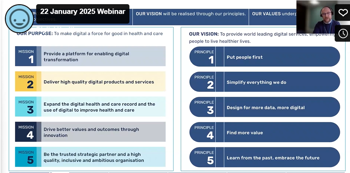
The strategy and other forthcoming initiatives were discussed in detail in ‘The Technology Landscape Across Health and Social Care in Wales’ webinar this week, where Access’s Director of Marketing for Health, Support and Care, Laura Thompson, brought industry experts Bryn Harries, Head of Strategy for Digital Health and Care Wales; Sarah Day, MD for Practice Solutions Ltd; and Cheri Lewis, Senior Midwife for Clinical Informatics, Cwm Taf Morgannwg University Health Board together to talk data and AI, digital literacy and inclusion, and to discuss how a technology-driven NHS can better support preventative care efforts in Wales.
The Landscape at Present
Like the wider UK, the health and social care landscape in Wales faces growing pressures from an ageing population, rising a rise in chronic conditions, and financial constraints. In 2024/25, the NHS in Wales allocated £11.74 billion to health and social care—49% of its total budget—yet challenges such as workforce shortages and long waiting times persist.
To address these issues, Wales is investing in digital transformation and focusing on a preventative approach to enhance service delivery and efficiency. The NHS Wales Aapp, now available across all 373 GP practices in the country, surpassed 170,000 downloads in March 2024, while telemedicine services like Consultant Connect helped prevent over 58,000 unnecessary hospital visits, including 28,000 A&E attendances between Dec 2023 and Nov 2024.
Despite these significant milestones, however, concerns over digital literacy, inclusion, interoperability, and data security remain hurdles on the road to transformation and continue to hinder progress.
Strategic Objectives to Overcome Barriers
During the webinar, several key questions emerged around the challenges and opportunities within Wales' digital health and social care landscape.
- How can digital transformation truly empower people and improve services?
- What are the critical steps needed to ensure inclusion and collaboration across the sector?
A Unified Approach
Bryn Harries provided an insightful overview of how Digital Health and Care Wales (DHCW) is addressing these issues through five core principles and five mission statements. But what do these guiding elements mean for frontline services, and how will they position Wales as a leader in digital health? Bryn emphasised that the goal is to create a system that empowers people to lead healthier lives by ensuring services are accessible, efficient, and responsive to evolving needs.

Reframing Processes, Not Just Technology
A crucial question raised during the discussion was: “Is digital transformation just about adopting new technology, or does it require a fundamental shift in how services operate?” Bryn (rightly) expressed how it’s not enough to implement new tools – organisations must reframe their processes to fully unlock the power of AI and other technologies.
He pointed out that even organisations using the same electronic patient record (EPR) system can face significant challenges if they fail to keep up with evolving initiatives and process improvements. The importance of collaboration was a recurring theme, with Bryn stating: "Collaboration between organisations, trusts, local authorities, and systems is integral."
Ensuring Digital Inclusion
Digital inclusion was another pressing concern. How can we ensure that digital solutions become a bridge to better health, rather than a barrier for those who struggle to access them? Cheri Lewis highlighted the risks of widening inequalities, warning: "Digital inclusion should be a bridge to better health, not a wall that makes it harder."
To overcome this, she advocated for:
- Alternative solutions for those unable to engage digitally
- Better digital literacy programmes to support users and staff
- Partnerships with third-sector organisations to assist vulnerable groups
However, as Sarah Day pointed out, inclusion isn’t always just about digital solutions. Some individuals can feel excluded when phone access is their only option, which is why it’s important for them to have multiple ways to engage with and contact these services. Sarah emphasised that in order to be truly inclusive, we must provide choice and flexibility to ensure “everyone can access care in a way that works for them.”
Cheri also raised an important challenge: Do frontline staff view digital tools as an enabler or an additional burden? She stressed that without proper support and training, there’s a risk that staff will see digital systems as obstacles rather than assets.
Balancing Technology with Human-Centred Care
How do we strike the right balance between technology and the personal, relationship-based nature of social care? Sarah reinforced the view that social care must remain a people-centred profession, stating: "Technology should serve to free up time for frontline staff to focus on relationship-based work."
She acknowledged that joining up health and social care services will take time but noted that digital tools, when effectively integrated, can help ease the administrative burden on individuals. Currently, many people have to repeat their stories across different services, which can beis both frustrating and inefficient. Sarah stressed: "There’s everything to play for, but we have to make the system work better for us to enable us to do better work with people."
The Path Forward
Wales is positioning itself to lead the digital health revolution. While the journey towards integrated care and digital transformation is a long and complex one, Wales is already demonstrating strong leadership with the strategic implementation of DHCW and its collaboration efforts across social care and various other sectors. As such, the future of digital health and social care in Wales looks promising and these new initiatives are poised to enhance the overall service delivery across the health and care ecosystem, ensuring that the benefits of technology-driven healthcare reach everyone, from the most vulnerable to the general population.

 AU & NZ
AU & NZ
 SG
SG
 MY
MY
 US
US
 IE
IE

